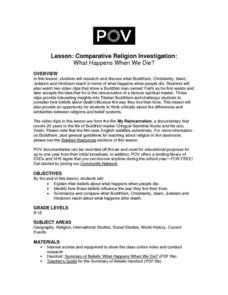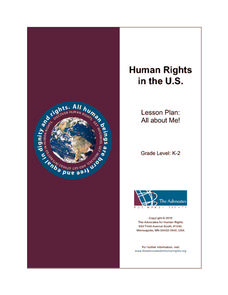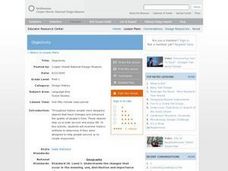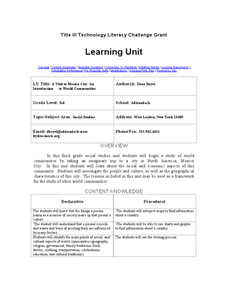American Documentary
Comparative Religion Investigation: What Happens When We Die?
How do different religions offer explanations for what happens when we die? Invite your learners to consider the variance and complexity of religious beliefs, and to research and compare/contrast the concept of death and afterlife...
National Geographic
World Waterworks Activity
As a way to quickly expose your science class to six different freshwater projects around the world, this lesson assigns each small group to research and share one. All of the information is gleaned from the website for CH2M HILL, a...
Curated OER
Legends of the Fifth
Students explore the the legends and myths of the Orient, Africa, Europe, Asia, and the Americas in this six lessons unit. Different cultures and belief systems of the inhabitants of these areas are examined through storytelling techniques.
Curated OER
Mythical Mayhem
Students explore Greek and Roman mythology in this five lessons unit. Common gods, their roles in the myth and stories of the era are surveyed as students take on the personality of a mythical character.
Curated OER
Life Giving Rivers
Students examine the world's rivers in this six lessons unit which mingles science with social studies. The dynamic forces that create erosion in nature are also seen as habitats and ecosystems that are affected by environmental and man...
Curated OER
Economics Concepts
Learners relate economics and government policies. In this lesson, students explore the relationship between economics and government policies. They understand how the economy works and can make better decisions as it relates to the future.
Curated OER
All About Me
Students identify personal traits. In this autobiographical art lesson, students read the book Whoever You Are and use art supplies to create a body cut-out of themselves. Students include physical characteristics on their cut out.
Curated OER
French and Family
Where is France? Interest young learners in exploring France, French language, and French culture. They identify similarities and differences between French and American families, speak the French words for family members, analyze maps,...
Curated OER
Objectivity
Help young readers examine historic artifacts to determine if they were designed to help people survive or to create enjoyment. They identify objects that were designed to help people to survive and to enjoy themselves. Then compare and...
Curated OER
Radio Program Disc 1, Track 6
Learners place the Ohio river in its historical and geographical context. They listen to the radio stories, and are asked what postive and negative influences does the Ohio River have on nearby communities>
NASA
The Case of the Wacky Water Cycle
Join the tree house detectives in learning about the processes of the water cycle, water conservation, water treatment, and water as a limited resource.
Curated OER
America the Beautiful
Learners listen to a read-aloud discussing the landmarks of the United States. In pairs, they use the internet to research a landmark of their choice. They create a visual aid to be given with a presentation sharing the information...
Curated OER
Art Using Sequence
Students are introduced to representative works of various artists including Paul Klee, Piet Mondrian, Sonia Delauny, Henri Matisse, Joan Miro and Henri Rosseau. They read books, participate in discussion and create original works of art.
Curated OER
The Respiratory System
Students explore the parts of the respiratory system in this six lessons unit. The lessons presnt the concepts of the breathing, the function of oxygen in the system, how sounds are made, and the effects of pollution, smoking and disease...
Curated OER
Scarcity of Land Throughout the World and in Hawaii
Students discuss the importance of "land." They review the four types of land classification--urban, rural, agricultural and conservation--and participate in an activity involving an apple that demonstrates the use of land in Hawaii....
Curated OER
Pizza and the Economy
Students become aware of the history behind pizza and how it was adapted to the economic and geographic conditions of the United States. They have a basic understanding of the concepts of supply and demand.
Curated OER
Soil: Food Mapping
Students examine the concept of food mapping . In this agriculture lesson, students explore food and agriculture systems in the United States in the past and today. Students complete food mapping activities.
Facing History and Ourselves
Who Am I?
Sixth graders explore how people throughout time have responded to questions regarding identity. For this The House on Mango Street lesson, 6th graders create an identity chart for a fictional character and then write personal essays...
Curated OER
World Statistic Day
Eleventh graders collect data about the state they live in. In this statistics lesson, 11th graders collect and analyze data as they compare themselves to students in other states. They analyze data about a person's education level, and...
Curated OER
President Roosevelt Seeks Feedback on New Deal Programs
In this primary source analysis activity, students analyze a letter from President Roosevelt to clergymen regarding New Deal programs. Students respond to 1 short answer question about the letter.
Curated OER
Thematic Unit: Beginning Holocaust Studies
Fifth graders discuss concepts of diversity, culture, and prejudice, gain understanding of harm caused by prejudice, and demonstrate ability to think critically and a desire to act morally.
Curated OER
A Visit to Mexico City: An Introduction to World Communities
Third graders complete a variety of activities as they take an imaginary trip to Mexico City, complete with passports, maps, and Spanish dictionaries. They write postcards to send home and create items to sell at the market. The unit...
Curated OER
Environment: The River Classroom
Seventh graders engage in hands-on experiments and activities dealing with rivers and greenways. They also observe lectures and demonstrations by experts in water and river restoration. Students and teachers participate in canoe trips...
Curated OER
Protecting the Planet
Students discuss being a responsible student by helping to protect the rainforest. In this citizenship lesson, students brainstorm ideas to help global warming, warfare, human-rights abuses and acid rain. Students write an essay to send...

























